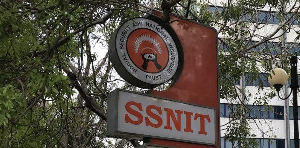Following the decision by the Board and Management of the Social Security and National Insurance Trust (SSNIT) to seek a strategic investor to manage its hotels, there have been numerous media commentaries and write-ups regarding the process.
While some of these opinions aim to educate the public on why it has become necessary for SSNIT to divest 60percent of its shares in the hotels to a private investor to manage and pay dividends, other comments and articles seem to deliberately attack the reputation of the institution.
Despite these negative assertions, it is important that people, particularly workers, understand that the SSNIT scheme is sound and that the pensions paid to retirees reflect their basic salaries during active service. Indeed, the same pension scheme that has been criticised for paying low pensions is also paying GH¢25,000, GH¢50,000, GH¢93,000, and even more than GH¢186,000 as monthly pensions to beneficiaries.
It is important to note that the process to divest SSNIT’s 60percent stake in the hotels began in earnest in 2010. It was not until 2017-2018 that the current Board supported Management in undertaking a Competitive Tendering process to appoint a transactional advisor and select a strategic investor, as prescribed by the Procurement Act. Therefore, this process is not new and cannot be considered secretive.
Since SSNIT transitioned from a Provident Fund to a Pension Fund in 1991, it has consistently met its financial obligations, ensuring timely payment of monthly pensions and related benefits to deserving beneficiaries. Its robust financial position ensures that all rightful claims are processed and honoured without fail in the shortest possible time.
Therefore, how can some people suggest that the recent events, such as the proposed sale of a 60percent stake in SSNIT hotels and concerns raised by the Labour Union, cast doubt on SSNIT’s ability to honour its financial obligations? Such claims appear motivated by ill will and should not be given credence. Similarly, allegations of mismanagement, bad investment, and questionable decisions causing financial and operational crises cannot be substantiated based on current facts and findings.
This piece serialises some comments and articles that were written in bad faith to denigrate the institution, which I in turn offer my honest opinion on them.
Financial/operational performance & benefits payment
Some people have pointed out that in 2021, SSNIT witnessed a significant decrease in total income, primarily due to an 18percent reduction in net contributions received, which dropped from GH¢4,106,623,000 in 2020 to GH¢3,368,335,000. They argue that the decline is a result of poor management decisions in effectively managing and growing the Scheme’s primary revenue stream. They also contend that the situation is due to political appointees managing SSNIT – who lack the requisite expertise in finance and social security administration.
Having assessed SSNIT’s 2021 Annual Report, it appears that such comments and opinions are inaccurate and misleading. This is because SSNIT’s total operating income in 2021financial year rather recorded GH¢3,903,635,000, but not GH¢3,368,335,000. Even though the figure they captured (GH¢3,368,335,000) is correct, that amount is the net contributions received, but not total income.
Although SSNIT recorded a decrease in total operating income from GH¢4,664,768,000 in 2020 financial year to GH¢3,903,635,000 in 2021, the decline is not because of mismanagement as they claim. Their assertion is highly erroneous, misguided and born out of malice.
Why the decrease?
The Bank of Ghana (BoG) in 2021 directed banks and Specialised Deposit-Taking Institutions (SDI) not to pay dividend to shareholders for the 2020/21 financial year. According to the central bank, this directive was to ensure that the banking sector generally remained robust and resilient in the era of Covid-19 Pandemic. As the largest investor in Ghana’s financial sector (SSNIT) and having invested in 22 out of 36 stocks under the Ghana Stock Exchange, these investee banks did not pay dividends to SSNIT because of the directive from BoG.
Again, reports gathered suggest that in 2020, SSNIT received GH¢2.6bn from the Controller and Accountant General’s (CAGD). This payment consists of GH¢1 billion in Government of Ghana (GoG) bonds as part payment of CAGD’s indebtedness to SSNIT and the remaining GH¢1.6 billion paid in cash to settle legacy debts – which dates back to past governments. Whereas in 2021, SSNIT received only a cash amount of GH¢1.39 billion from the CAGD without any bonds.
Therefore, the decrease in total operating income cannot be classified as poor management decision, political interference, mismanagement nor a lack of requisite expertise. However, government’s dynamics regarding payment of contributions of public sector workers plays a crucial role in shoring up the total income of SSNIT.
Already, SSNIT has noted it will continue to engage with the Government to settle the remaining arrears (principal) of its indebtedness, as well as penalties and accrued interests. Sources close to SSNIT have confirmed that these ongoing engagements have recently resulted in a positive outcome, with the Government settling approximately GH¢2.5 billion owed SSNIT.
In terms of benefits paid to beneficiaries, more than GH¢3.6 billion was paid out as benefits for 2021 as compared to GH¢3.3 billion paid in 2020, representing an increase of 9.86percent. This demonstrates SSNIT’s commitment to honour its financial obligations to its beneficiaries coupled with the fact that the average processing time for pensions improved from 12 days in 2020 to 10 days in 2021. This indicates that the current Management of SSNIT has significantly improved on their operations and service delivery.
Investment, expenditure and political interference
As of December 31, 2021, the total investment portfolio of the Trust had increased by 12.13percent from GH¢10,084.36 million in 2020 to GH¢11,307.75 million which shows prudent investment strategies. The significant improvement in returns is mainly due to the excellent performance of listed equities under the Ghana Stock Exchange.
So, for someone to suggest mismanagement and questionable decision on the part of current Management of SSNIT in this regard, this evidence cited above points that their claim of mismanagement and political interference is ambiguous, vague and “outmoded at birth.”
Over the past years, SSNIT’s Investment Portfolio has grown by 21.31 percent, from GH¢9,321.45 million in 2017 to GH¢11,307.75 million in 2021, representing a compounded annual growth of 4.95percent over the five-year period under review.
To address the issue of a surge in total expenditure, it is important to consider both direct costs and operational &administrative costs. SSNIT is mandated by Article 80 of the National Pensions Act, 2008 (Act 766) to annually review and index pension payments. As long as it adheres to this mandate, coupled with the increasing number of retirees on a daily basis, it is expected that the SSNIT’s direct costs and expenditures will rise.
The increase in expenditure cannot be attributed to mismanagement, questionable decisions, or political interference by the Government, but to improve the lot of pensioners as SSNIT seeks to maintain the Pensioners’ purchasing power.
Position of the trust/contributor base
The active contributor population increased from 1,633,505 in 2020 to 1,734,168 in 2021, representing a modest growth of 6.16percent. The current number of active contributors is more than 1.9 million, information available on SSNIT website suggests.
In addition, the number of pensioners also decreased from 227,407 to 225,768, representing a dip of 0.72percent. This decrease was as a result of the mass deactivation of the names of 22,920 pensioners from the Pension Payroll for the non-renewal of their Pensioner Certificates. At any point when a deactivated pensioner resurfaces, they are reactivated on the Scheme and paid what is due them.
Following the recent External Actuarial Valuation Report by the International Labour Organisation (ILO), SSNIT noted that theScheme receives contributions and has enough funds to pay accruing benefits due members. Indeed, the Scheme is partially funded and that pensions and its related benefits are funded from contributions and returns from investments. Over the past years, there has been steady growth in contributions and investment returns. This growth is well supported by the current demographics and the SSNIT’s resilience in enrolling new workers, particularly the self-employed, and encouraging them to contribute to the Scheme.
Recently, it was reported that over 100,000 self-employed individuals have joined SSNIT and are actively contributing. This is certainly a good step by Management in their attempt to provide income security for workers and ensure that all workers get pension upon retirement. People cannot underestimate these achievements for political gains.
Portfolio performance
It should be noted that SSNIT does not make investments without guidance. All investment decisions are made in accordance with its Investment Policy & Guidelines and approved by the sector regulator, the National Pensions Regulatory Authority (NPRA). According to SSNIT’s Annual Report for the period ended 2021, Gross Investment Income recorded in 2021 amounted toGH¢495.54 million. This amount represents an increase of 0.79percent compared to the 2020 figure of GH¢491.64 million.
SSNIT has indicated that it will continue to appraise and restructure its investment portfolio in accordance with their Investment Policy & Guidelines to achieve short-to-medium term investment objectives. The move goes to suggest that the organisation is well positioned to withstand any economic downturn as it did when the Covid-19 Pandemic struck. When companies were laying off employees and/or downsizing, SSNIT paid over 200,000 Pensioners on its pension payroll throughout the Covid period.
These points demonstrate SSNIT’s commitment to financial prudence, investment growth, and operational efficiency amidst challenging conditions as against the call by some social commentators that SSNIT is in operational crisis, necessitating urgent restructuring. Such calls cannot be substantiated with facts and should be ignored.
Sale of 60 percent shares and conflict of interest
Reports reveal that more than GH¢200 million has been invested in hotels, yet SSNIT has not received any dividends in return. Those who oppose the Trust’s decision to divest a 60percent stake in the hotels to a private investor should propose viable alternatives to revive these properties. Definitely, SSNIT should not continue investing workers‘ contributions and pensioners’ fund into underperforming assets.
Importantly, both the SSNIT Board and Management have been proactive in safeguarding the Scheme, stating their commitment to ongoing engagements with stakeholders, particularly Labor Unions, to chart the way forward. Regarding conflict of interest that has been widely talked about, I would want to hold on and defer my submission until the Commissioner on Human Rights and Administrative Justice (CHRAJ) completes their investigation, releases their findings before expressing my candid opinion.
Conclusion/SSNIT’s value proposition
A value proposition demonstrates the uniqueness of a product a brand offers to members, clients, and the public that no other competitor provides. The SSNIT Scheme, for example, offers unique value and pays benefits promptly. For instance, SSNIT pensioners, including my father, will attest that they receive payment alerts every third Thursday of the month.
It is instructive to note that the SSNIT Scheme pays monthly pension until death if one contributes for the minimum 180 months and more. Thus Pensioners get peace of mind knowing that every month, their account will be credited. The Scheme also provides disability insurance to contributors in the event of accident or permanent illness that prevents a contributor from working again. This implies that if a member cannot work again due to accident or illness, SSNIT steps in to pay monthly pension to qualified beneficiaries regardless of age.
Also, the Scheme provides life insurance to Members through the payment of Survivors’ Benefits to the nominated dependants. This gives assurance to members that should they pass on, their survivors would be paid a lump sum by SSNIT.
Business News of Tuesday, 30 July 2024
Source: thebftonline.com

















